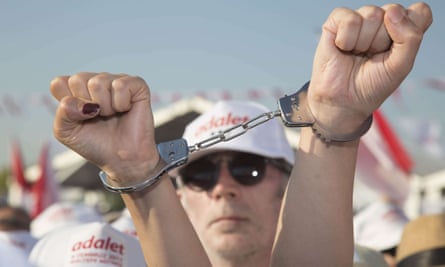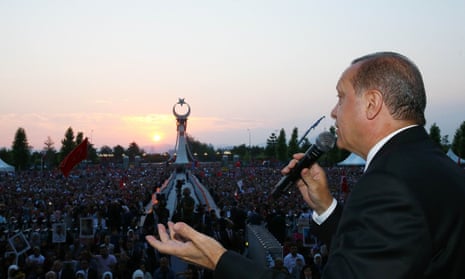The Turkish president, Recep Tayyip Erdoğan, signalled on Sunday that his government would not relent in its crackdown against the alleged perpetrators of last year’s coup attempt, which has since been broadened to include dissidents, journalists and human rights activists, as the country entered its second year since the July 2016 moves to unseat him.
In a pair of combative and emotive speeches replete with religious invocations, the Turkish president pledged to support the reintroduction of the death penalty if it were approved in parliament, drawing a warning from the European Union over Turkey’s stalled membership talks.
Erdoğan also harshly condemned an opposition leader who refused to take part in the commemorations, in moves that will anger western allies and alienate the opposition – which took part in thwarting the coup attempt Turkey blames on supporters of the exiled cleric Fethullah Gülen.
Erdoğan’s focus on religion was also a pointed challenge to secularists who believe the republic’s founding principles are being undermined. The commemorations included a recitation of Qur’anic verses on betrayal, martyrdom and standing one’s ground in front of enemies, as well as an extended prayer by the head of the religious affairs directorate on the steps of the Turkish parliament.
Erdogan’s uncompromising words, delivered by an apparently buoyant president, suggested no let-up in the divisions that have polarised Turkey in recent years along traditional lines of religion, secularism, class and ethnicity going into presidential and parliamentary elections scheduled for 2019.
“Did my nation march against the scoundrels and traitors with weapons in their hands? No, my nation march with their flag and their faith,” Erdoğan declared at a pre-dawn rally in the capital on Sunday marking the moment when the coup plotters bombed the Grand National Assembly. “There is no other example of this. There is no other people that stopped the bullets with their chests.”
The address was timed to mark the exact moment a year ago when fighter jets bombed the Turkish parliament as tanks rolled out on to the streets of Ankara and Istanbul in an attempt to overthrow the elected government.

The coup attempt was defeated when thousands of Turks of all political stripes took to the streets to resist the soldiers, at the cost of at least 290 dead and more than 2,100 wounded. Turkey has yet to come to terms with the coup attempt, and now lives in the shadow of a response that has seen tens of thousands of civil servants, judges, academics, journalists, police and military officers purged or imprisoned over alleged links to Gülen’s movement.
That crackdown has gone beyond the alleged perpetrators to include dissidents, human rights campaigners and even senior opposition lawmakers. Turkey now imprisons more journalists than any other country in the world and, under the state of emergency, many of those detained have been in limbo for months without formal indictments.
Erdoğan indicated in his speech at parliament that the nationalsecurity council would this coming week recommend another three-month extension.
But more controversial was his reiteration in his two speeches, the first before hundreds of thousands at the Bosphorus bridge in Istanbul where 36 people were killed, that he would back reintroducing the death penalty if it was approved by parliament.
Turkey had abolished the death penalty as part of a series of reforms ushered in by Erdoğan as prime minister that were meant to bring the country’s laws into line with European Union legislation as part of Ankara’s accession talks. But membership negotiations have been frozen for years and the return of capital punishment, a prospect raised seriously in the aftermath of the coup and a key demand of his nationalist allies, would put a definitive end to them.
In response to chants of “idam isteriz” (“we want execution”) from crowds at both rallies, the president said he would not hesitate to sign such a bill into law if it were to be passed in the legislature.
The president described the coup plotters as “unbelievers” and said the country would “cut the heads off” traitors bent on destabilising the nation. He said that he wanted those standing trial for taking part in the coup to wear a uniform “like in Guantánamo”.
The president of the European commission, Jean-Claude Juncker, warned on Sunday that reinstating the death penalty would end any hope of Turkey joining the EU.
“If Turkey were to introduce the death penalty, the Turkish government would definitively slam the door on EU membership,” he wrote in a German newspaper. “[Turkey] should move closer to Europe rather than moving away from us.”
Erdoğan also targeted the leader of the main opposition party, Kemal Kılıçdaroğlu, who one year ago joined the president at a rally in Istanbul after the coup that briefly offered the possibility of unity in the divided nation. The opposition leader has repeatedly used the phrase “controlled coup” to describe the putsch, an insinuation that the government may have known about it in advance and did nothing to stop it.
The opposition has long demanded a more thorough accounting of the night of the coup, but government supporters believe hints of a conspiracy are a betrayal and a serious disrespect to the memories of the victims who died resisting the military takeover. Kılıçdaroğlu’s party declined to take part in the commemoration events, arguing that the government had co-opted the narrative of the coup’s defeat.
